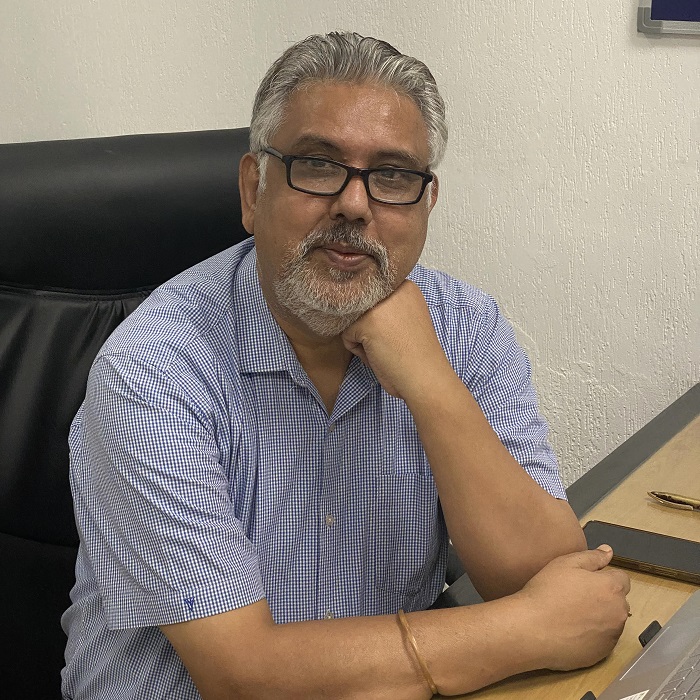The Electronics Sector Skills Council of India (ESSCI) has been launched with a primary mandate of enhancing and building a capacity in skill development. One of the salient features of the ESSCI is designing the training programmes, based on industry demands of different segments and ensuring that all successful trainees are certified through accredited assessment agencies.
ELE Times Correspondent Mayank Vashisht had an opportunity to have an in-depth insightful conversation with the officiating head of ESSCI, Piyush Chakraborty. Currently serving his fifth year at ESSCI, Piyush had seen the growth of the electronics sector very closely, quoting him, he has seen this industry grow ‘not only arithmetically and geometrically, but exponentially. In fact, during the time of the pandemic, almost thousand companies are showing interest to shift their base to India’, added Piyush.
Excerpts:
ELE Times: You have seen the global electronics industry evolve very closely, how do you narrate the growth and the future prospects of the electronic industry for India in comparison to its contemporaries?
Piyush: The electronics sector is experiencing an unprecedented buoyancy with the media reports of over 1000 companies in the electronics sector considering migrating to India and it is a preferred location for the electronics Industry, given the incentives and benefits the Government is giving for Electronics Manufacturing in the country. Also, the healthcare-related electronics along with IT Hardware to enable remote access and online communication have been in large demand and the supply of manpower has been in good demand. ESSCI has stepped in to fill the gap and it is expected to be the primary agency of choice for the industry for all their manpower needs. The growth of the electronics Industry in India is among the highest in the world.
ELE Times: India has traversed a long way with technology revolution and now it is aiming with very high spirits to become the electronic hub of the world, how far is this dream from reality?
Piyush: The Electronics Sector is currently growing at a rapid pace in the country, fuelled by strong policy support, Government incentives and a growing market, a very large amount of investments are currently flowing in the country. The ESDM sector in India is predicted to reach US$ 220 billion by 2025, expanding at 16.1% CAGR between 2019 and 2025. The growth trajectory is riding on high local demand and international market growth. ESSCI is fully geared to meet the challenge of the growth in the country and is prepared to mobilise and skill the youth for high demand job roles
ELE Times: Please treat our readers with a holistic overview of ESSCI and how it is encouraging to enable a world class electronics manufacturing industry in India?
Piyush: ESSCI is responsible for standardization, accreditation and certification processes to enhance the employability of the Indian workforce globally. It envisions to enable a world class electronics manufacturing industry with an effective ecosystem for skill development and enhance employability of the large number of Indian youth.
The approach of ESSCI is to build a robust ecosystem of partners and knowledge contributors leading to research and analysis and developing a training mechanism leading to accreditation and certification of trained resources
ESSCI has over 250 training partners having over 4000 training centres across the country, that are well equipped to undertake skill development across job roles in all segments of ESDM.
ESSCI has developed 178 Qualification Packs (QPs) and over 250 National Occupation Standards (NOS). The QPs are across the 10 sub-sector spectrum and across the product life cycle.
ESSCI is aligned to the many global knowledge partners and its endeavour is to align the country’s skill development mechanism to global levels. It is committed to ensure the skill development regime in the country is benchmarked to the global standards and is able to service the country’s electronics sector to create skilled resources with the highest calibre.
ELE Times: What challenges ESSCI had to undergo during the unprecedented outbreak of COVID-19?
Piyush: The current Covid pandemic and resultant lockdown has put the council under tremendous pressure to ensure supply of skilled manpower in the current situation and the pandemic making it difficult to conduct training physically. The management has refined the working style and the team is working overtime. The work from home was contributing to efficiency and productivity with online tools like Zoom / Google meeting happening twice a day for review and all groups formed to work on specific tasks which have emerged in the Covid-19 lockdown and pandemic. The team is online every day to discuss the daily activities and are monitored through online tools.
The council has embarked upon developing a robust delivery mechanism using their state of the art Learning Management System- LMS for delivery of training online and through remote mechanism of using IT and digital tools with AR/VR, DIY, Videos and host of easy learning tools.
The council has been successful in surmounting challenges imposed by the Covid lockdown and are now poised to grow using online and virtual systems.
ELE Times: Do you feel that ESSCI is really making its students industry ready? Please share some of the examples for the same.
Piyush: The council is seamlessly integrated into the electronics industry in the country. We have imparted a soft skill part in each of our qualification packs to make the students ready for industry. We are encouraging candidates to opt for the apprenticeship and B.VoC programme so that they can take advantage of practical experience during on-the job training along with theory knowledge. Now students are being trained as per Industry demand through our LMS platform.
ELE Times: Do you feel that there has been a prolonged disparity between the curriculum that institutions in India provide to students and the real skill knowledge that the students really require to prosper in the industry? How can this gap be bridged and institutions can come in sync with industries?
Piyush: The conventional education system had lagged over the past years and the Government has also realised this and the New Education Policy of the government of India seeks to vocationalize the education system in India. However, the National Skill Qualification Framework and new mechanism for skill development in India seeks to align the effort to Industry. ESSCI is building the structured mechanism for imparting Industry oriented Skill development in the electronics sector. For example, what we are doing is, for normal graduation courses like BSc, we are doing an industry integrated course. For three semesters’ there will be a complete OGT in the industry for the students. The best part is these courses will be multiple entry and multiple exit courses. For engineering colleges we are telling them that we need their last six months, we added three more months to that and for nine months we are doing a complete industry integrated course with them. So, in nine months the student will learn from the new and emerging technologies and after nine months the student will surely get a job plus he/she will have a rich experience and because of the industry training the student will know exactly what the industry is actually looking for.
Adding to that, we are also planning to launch a ‘Super 100’ programme. We are doing Super 100 in SDI (Skill Development Institute) Bhuweneshwar. We are planning to take two courses right now, Data Science and Cyber security and on those courses we will have 100 students each (on the basis of merit) and those 100 students will be mentored by 50 guides. For six months it will be completely study and for 3 months there will be OGT in the mentor’s factory. Because this plan is for tier 2 and tier 3 cities, we are planning that they should get a minimum job of at least 50000 rupees. The Pilot for this program will be for this year only.
ELE Times: How far ESSCI has been successful to penetrate India at the grassroots level?
Piyush: The council has had a very successful journey since its inception in 2012. ESSCI has embarked upon building a robust and expansive skill development network and currently has over 1100 training partners having over 4550 training centres across the country, that are well equipped to undertake skill development across job roles in all segments of ESDM. ESSCI has developed 159 Qualification Packs (QPs) and over 250 National Occupation Standards (NOS).
The council has trained and certified over 10400,000 candidates in various job roles across the electronics product lifecycle and sub-sector spectrum and is poised to support the Aatmnirbhar Bharat initiative by ensuring supply of appropriately skilled manpower in electronics job roles for the companies setting up shop in India.
The council is developing new job roles in new age economies like AI, IoT, Industry 4.0, Automation, robotics, 5G and other emerging technologies.
We have 4000 centres across the country and with the majority in the rural areas, we have been successful in penetrating the rural areas and bringing the benefits to the rural youth in a large manner.
ELE Times: Describe your journey as an officiating head of ESSCI so far. What were the major roadblocks that you had to face during this journey?
Piyush: I have been in the council for the last five years and so I am very familiar with the whole eco-system and mechanism. The major roadblock was expected to be Covid related lockdown and the resultant demand form the electronics industry for suitable manpower. We see a lot of demand coming from the industry and also the academia is not in the vocational mode and are seeking to align their education system to the new education policy where Industry alignment and vocational education is the key. The new shift in approach brought challenges, but with our new offering and mechanism aligned to vocationalisation of education, we are on a good path to growth.
ELE Times: Your thoughts about the future of ESSCI and its contribution to the Indian electronics industry.
Piyush: The next five years are going to be extremely exciting as far as the electronics sector is concerned. The Council is in the process of reinventing itself and deeply studying the trends which are going to define the electronics sector.
The National Policy for Electronics 2019 specifically launches the Production Linked Incentive Scheme (PLI) for Large Scale Electronics Manufacturing. PLI for Large Scale Electronics Manufacturing proposes a financial incentive to boost domestic manufacturing and attract large investments in the electronics value chain and aims to create over 8,00,000 Jobs.
The jobs expected to be created would mostly be related to the factory manufacturing job roles for assembly line operators, PCB assembly, EMS operators, and maintenance engineers and trained in robotics, automation and Industry 4.0 related job roles.
Production Linked Incentives of up to INR 40,951 crores will be awarded over a period of 5 years for Mobile Phone, Specified Electronic Components includes Medical Electronics, SMT components Discrete semiconductor devices including transistors, diodes, thyristors, etc., Passive components including resistors, capacitors, etc. for electronic applications, Printed Circuit Boards (PCB), PCB laminates, prepregs, photopolymer films, PCB printing inks, Sensors, transducers, actuators, crystals for electronic applications, System in Package (SIP) Micro / Nano-electronic components such as Micro Electromechanical Systems (MEMS) and Nano Electromechanical Systems (NEMS) and Assembly, Testing, Marking and Packaging (ATMP) units.
Mayank Vashisht | Sub Editor | ELE Times


